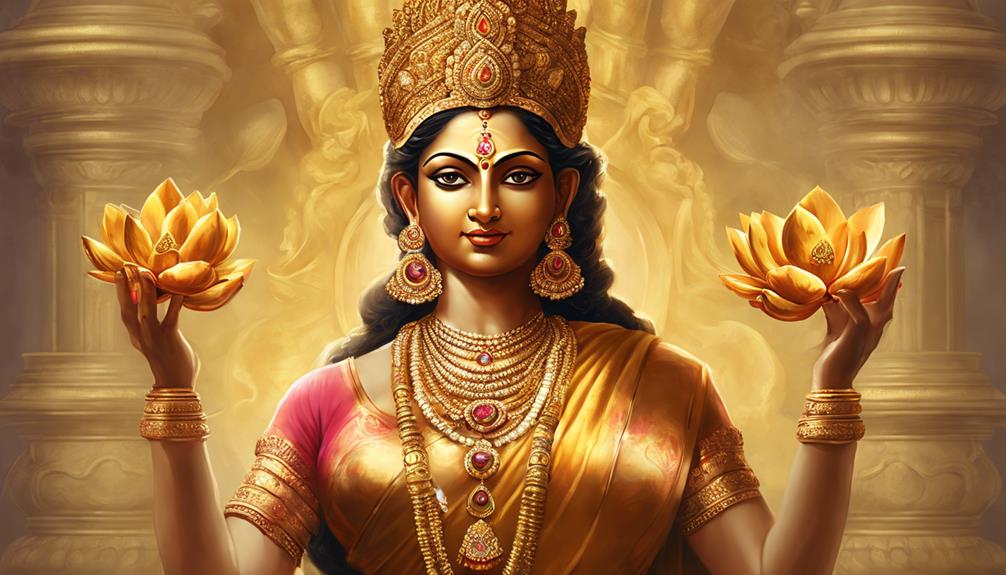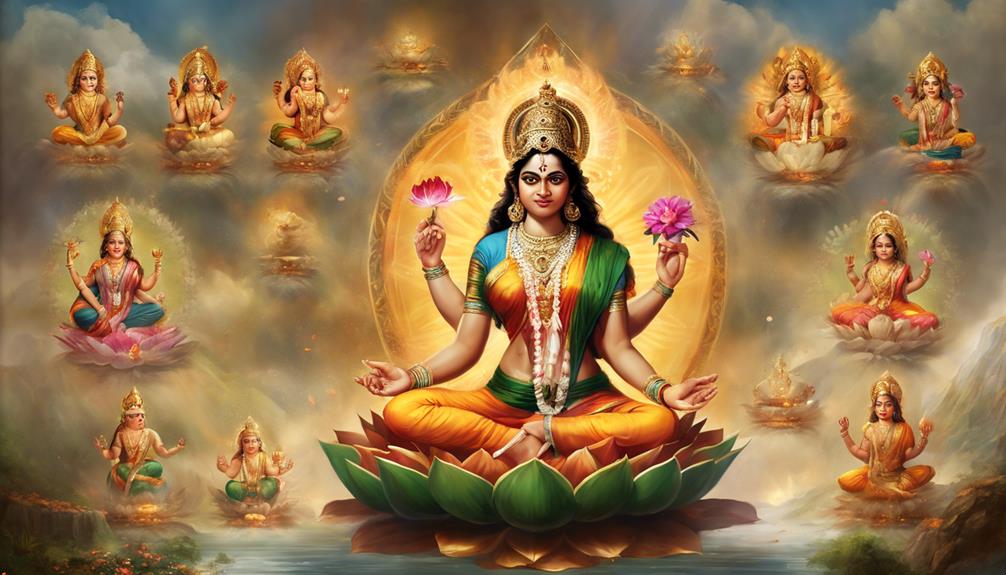The Ashta Lakshmi, the Eight Forms of the Goddess Lakshmi in Hindu mythology, encompass a range of life aspects such as financial prosperity, intellectual wealth, courage, victory, abundance, spiritual growth, wealth management, opulence, blessings, and fulfillment. Each form symbolizes a specific facet of life and prosperity, reflecting different dimensions of abundance and well-being. Understanding the significance of these diverse aspects offers insight into the multifaceted nature of prosperity and spiritual enrichment inherent in the worship of the Ashta Lakshmi.
Table of Contents
Key Takeaways
- Ashta Lakshmi are the Eight Forms of Goddess Lakshmi in Hindu mythology.
- They represent aspects like financial prosperity, intellectual wealth, courage, victory, and abundance.
- Each form symbolizes different facets of life and prosperity.
- They embody wealth, success, courage, knowledge, victory, and spiritual growth.
- Ashta Lakshmi hold profound significance for well-being, success, and prosperity.
Origins of Ashta Lakshmi
The origins of Ashta Lakshmi can be traced back to ancient Hindu mythology, where each aspect of the goddess symbolizes different facets of life and prosperity. Ashta Lakshmi, also known as the Eight Forms of the Goddess Lakshmi, are revered in Hinduism for their representation of wealth, success, and well-being. The symbolism behind each form provides a thorough understanding of the various dimensions of abundance and prosperity.
Each form of Ashta Lakshmi embodies unique attributes that cater to different aspects of life. The forms include Adi Lakshmi, who signifies primordial energy and existence, Dhana Lakshmi for material wealth, Dhanya Lakshmi for agricultural prosperity, Gaja Lakshmi for strength and power, Santana Lakshmi for progeny and fertility, Veera Lakshmi for courage and valour, Vijaya Lakshmi for victory and success, and Aishwarya Lakshmi for knowledge and wisdom. These aspects collectively represent the diverse manifestations of abundance in Hindu mythology, enriching the symbolism associated with Ashta Lakshmi.
Importance in Hindu Mythology
Signifying enduring significance and profound symbolism, Ashta Lakshmi holds a pivotal role in Hindu mythology, embodying various dimensions of abundance and prosperity. In Hindu mythology, the Ashta Lakshmi are revered as manifestations of the goddess Lakshmi, representing different forms of wealth and well-being. Each aspect of Ashta Lakshmi symbolizes unique qualities that are essential for a balanced and prosperous life. Their presence in Hindu mythology signifies the spiritual significance attached to the concept of wealth and abundance, going beyond material possessions to encompass virtues like courage, knowledge, and victory.
The stories and symbolism surrounding the Ashta Lakshmi in Hindu mythology serve as moral and philosophical lessons, emphasizing the importance of cultivating attributes that lead to holistic prosperity. Through their depiction in myths and legends, the Ashta Lakshmi inspire devotees to seek not only material wealth but also spiritual growth and fulfillment. Their portrayal highlights the interconnectedness of material and spiritual well-being, encouraging individuals to aim for a harmonious existence that encompasses both aspects of life.
Goddess of Wealth: Adi Lakshmi

Adi Lakshmi, the Goddess of Wealth in Hindu mythology, embodies the essence of primordial abundance and prosperity. Adi Lakshmi represents the primal source of wealth and affluence in the universe. She's often depicted with four hands symbolizing righteousness, desires, wealth, and liberation.
As the primary form of Lakshmi, Adi Lakshmi is revered for bringing material and spiritual wealth to her devotees. Her presence signifies the importance of wealth not just within the context of material possessions but also in spiritual enrichment. Adi Lakshmi is believed to bestow blessings of prosperity, success, and fortune upon those who worship her with devotion and sincerity.
In Hindu traditions, she's worshipped to seek blessings for financial stability, growth in business, and overall prosperity in life. Devotees of Adi Lakshmi often offer prayers and perform rituals to invoke her blessings for abundance and well-being.
Through her divine grace, Adi Lakshmi continues to inspire individuals to seek wealth and abundance in both material and spiritual domains.
Goddess of Knowledge: Dhana Lakshmi
Dhana Lakshmi, the Goddess of Knowledge in Hindu mythology, embodies the essence of intellectual wealth and enlightenment, complementing the prosperity brought by Adi Lakshmi. In Hindu culture, the connection between wealth and knowledge is deeply ingrained, with Dhana Lakshmi symbolizing the importance of wisdom in acquiring and managing material riches. The significance of Dhana Lakshmi transcends mere financial wealth; she represents the value of education, learning, and intelligence in the pursuit of prosperity.
Dhana Lakshmi's symbolism highlights the cultural belief that true wealth encompasses not only material abundance but also intellectual richness. By venerating Dhana Lakshmi, devotees acknowledge the role of knowledge in achieving success and understanding the world. This Goddess serves as a reminder of the interconnectedness between education and financial stability, encouraging individuals to seek enlightenment alongside material gain.
The worship of Dhana Lakshmi underscores the holistic approach to wealth in Hinduism, emphasizing the balance between material possessions and intellectual enlightenment. Through her representation, followers are encouraged to cultivate both their financial resources and their intellectual capabilities to lead a fulfilling and prosperous life.
Goddess of Courage: Dhanya Lakshmi

The Goddess of Courage in Hindu mythology, Dhanya Lakshmi, embodies the essence of bravery and resilience, showcasing the valor required to navigate life's challenges. Dhanya Lakshmi symbolizes courage, strength, empowerment, fearlessness, determination, and bravery. She's revered for instilling in individuals the fortitude to face adversities with unwavering resolve and unwavering courage.
Courage, a central theme associated with Dhanya Lakshmi, represents the ability to confront fear, pain, danger, uncertainty, or intimidation. Through her embodiment of courage, she inspires individuals to stand tall in the face of obstacles, empowering them to overcome hurdles with grace and determination. Strength is another trait attributed to Dhanya Lakshmi, illustrating the inner power needed to persevere through life's trials.
Furthermore, Dhanya Lakshmi's presence in Hindu mythology serves as a reminder of the importance of fearlessness and bravery in one's journey towards personal growth and self-discovery. By embodying these qualities, individuals can tap into their inner reservoir of strength and courage, enabling them to navigate life's challenges with resilience and grace.
Goddess of Victory: Gaja Lakshmi
In Hindu mythology, Gaja Lakshmi epitomizes triumph and victory, embodying the essence of success and prosperity. Gaja, meaning elephant, symbolizes power, strength, and royalty in Hindu culture. The elephant symbolism associated with Gaja Lakshmi represents the ability to overcome obstacles with grace and dignity, much like the majestic elephant moving along its path with confidence.
The victory embodied by Gaja Lakshmi goes beyond mere conquests; it signifies achieving success through perseverance, determination, and strategic thinking. This victory isn't just about external battles but also internal struggles, symbolizing the triumph of the human spirit over adversity.
Wealth manifestation through Gaja Lakshmi is about more than material riches; it encompasses abundance in all aspects of life, including spiritual, emotional, and intellectual wealth. The manifestation in courage ties back to the idea that true prosperity comes not just from financial gain but from the courage to face challenges head-on and emerge victorious.
In essence, Gaja Lakshmi teaches us that victory isn't just about winning battles but about conquering our fears, overcoming obstacles, and achieving success with grace and fortitude.
Goddess of Luxury: Santana Lakshmi

Santana Lakshmi, the Goddess of Luxury, embodies wealth and abundance in various forms. She symbolizes material possessions and prosperity, signifying opulence and the blessings of affluence. Her presence represents the aspect of life that brings comfort and luxury.
Understanding Santana Lakshmi's significance sheds light on the importance of material well-being and the role it plays in our daily lives.
Wealth and Abundance
Representing opulence and material prosperity, Santana Lakshmi embodies the essence of wealth and abundance within the Ashta Lakshmi framework. This aspect of the divine signifies not only financial stability but also contributes to spiritual growth.
Santana Lakshmi is revered for her capacity in manifesting abundance in one's life, leading individuals towards a state of inner peace. Through invoking her blessings, individuals seek to attain not just material riches but also a sense of contentment and fulfillment.
The worship of Santana Lakshmi is often associated with cultivating a mindset of gratitude and generosity, encouraging a harmonious relationship with wealth and resources. By focusing on this aspect of the Ashta Lakshmi, individuals aim to align themselves with the energy of prosperity and abundance in all facets of life.
Material Possessions
Within the domain of Ashta Lakshmi, the aspect of Material Possessions embodied by Santana Lakshmi encapsulates the essence of opulence and luxury, symbolizing a pathway to both material wealth and spiritual enrichment. Santana Lakshmi represents not only the accumulation of material possessions but also the responsible management of wealth and the attainment of financial stability.
In today's society, the allure of consumerism and materialism often overshadows the importance of wealth management and financial stability. Santana Lakshmi serves as a reminder that true prosperity comes not just from the acquisition of material goods but from the wise utilization of resources. By embracing the teachings of Santana Lakshmi, individuals can cultivate a balanced approach to wealth that guarantees not only material abundance but also spiritual fulfillment.
Prosperity and Opulence
Within the dominion of Ashta Lakshmi, the embodiment of opulence and luxury shines through the persona of Santana Lakshmi, signifying a pathway to both material wealth and spiritual enrichment.
Santana Lakshmi represents the aspect of prosperity and opulence, guiding individuals towards wealth management and financial success. In Hindu mythology, Santana Lakshmi is revered for bestowing devotees with the blessings of abundance and affluence.
Her presence symbolizes not just the acquisition of material possessions but also the importance of utilizing wealth for the greater good and spiritual growth. By worshipping Santana Lakshmi, individuals seek not only financial stability but also the wisdom to manage their resources judiciously.
Embracing the teachings of Santana Lakshmi can lead one towards a balanced life where prosperity is harmoniously intertwined with spiritual well-being.
Goddess of Prosperity: Vijaya Lakshmi

Vijaya Lakshmi, the Goddess of Prosperity, is revered for her ability to bestow wealth and success upon those who worship her. In Hinduism, she's known as the Goddess of Victory, symbolizing triumph, prosperity, and fortune. Vijaya Lakshmi is depicted as carrying a lotus, symbolizing purity, and standing on a golden throne, signifying power and grace.
Devotees believe that by invoking Vijaya Lakshmi, they can achieve victory in their endeavors, whether they're related to material wealth or spiritual growth. She's believed to bring success in various aspects of life, including business, education, and relationships. People often pray to her for blessings of prosperity, good luck, and abundance.
Vijaya Lakshmi's presence is said to bring harmony and fulfillment, aligning individuals with positive energies that attract prosperity and victory. By honoring and seeking her guidance, followers aim to overcome obstacles, achieve their goals, and lead a prosperous life filled with success and abundance.
Goddess of Good Fortune: Vidya Lakshmi
Vidya Lakshmi embodies wisdom and prosperity, symbolizing the importance of knowledge and abundance in one's life. Her presence signifies the blessings of intellect, education, and the enrichment of one's mind and material well-being.
Understanding Vidya Lakshmi's significance sheds light on the value of learning, growth, and the connection between wisdom and good fortune.
Vidya Lakshmis Wisdom
Wisdom embodied in the form of Vidya Lakshmi, the Goddess of Good Fortune, epitomizes the profound essence of knowledge and prosperity intertwined in Hindu mythology. Vidya Lakshmi symbolizes divine wisdom, offering spiritual growth and enlightenment to her devotees. She represents the importance of intellectual strength and education in achieving prosperity and success.
Through her blessings, individuals are encouraged to seek knowledge, wisdom, and understanding to navigate life's challenges with clarity and insight. Vidya Lakshmi's wisdom transcends mere academic learning; it encompasses the ability to discern right from wrong, to make informed decisions, and to cultivate a deeper understanding of oneself and the world.
Vidya Lakshmis Prosperity
In exploring the domain of prosperity attributed to Vidya Lakshmi, one immerses into the interconnected facets of abundance and spiritual growth within Hindu mythology. Vidya Lakshmi, the Goddess of Good Fortune, embodies the essence of educational success and financial prosperity. She's revered for bestowing individuals with the wisdom and knowledge necessary to attain material wealth and success in their academic pursuits.
Devotees seek her blessings to achieve not only worldly riches but also spiritual enlightenment. Vidya Lakshmi's prosperity isn't limited to material gains; it encompasses the holistic development of an individual, balancing the pursuit of educational excellence with spiritual growth.
Worship and Significance in Hinduism

Worship of the Ashta Lakshmi in Hinduism holds profound significance, symbolizing various aspects of life and prosperity. The ritual practices associated with the Ashta Lakshmi involve offering prayers, performing aarti (a ritual of worship), and reciting hymns to invoke blessings of wealth, fortune, knowledge, and success. Each form of Lakshmi represents different facets of abundance and well-being, emphasizing the importance of balance in one's life. The spiritual significance lies in the belief that by worshipping these goddesses, one can attain not just material wealth but also inner peace and spiritual growth.
Cultural celebrations and community traditions play a crucial role in the worship of Ashta Lakshmi. During festivals such as Diwali and Navaratri, devotees come together to honor the Ashta Lakshmi through elaborate rituals and ceremonies. These celebrations foster a sense of unity and devotion among participants, reinforcing the values of gratitude, generosity, and prosperity within the community. The worship of Ashta Lakshmi serves as a reminder of the interconnectedness of material and spiritual wealth in Hindu culture.
Frequently Asked Questions
How Are the Ashta Lakshmi Different From Other Hindu Goddesses?
The Ashta Lakshmi stand out from other Hindu goddesses due to their symbolic significance in representing various aspects of life. Understanding these cultural differences enriches religious practices and deepens spiritual beliefs among followers.
Are There Any Specific Rituals or Ceremonies Associated With Each of the Ashta Lakshmi?
In Hindu tradition, specific rituals and ceremonies are associated with each of the Ashta Lakshmi, focusing on prosperity, knowledge, courage, and other aspects of life. These practices aim to invoke blessings and cultivate abundance.
Are There Any Temples Dedicated Specifically to the Worship of the Ashta Lakshmi?
Yes, there are temples dedicated to the Ashta Lakshmi where devotees gather to worship and offer prayers. The devotion shown at these temples through offerings signifies the significance of each aspect of life represented.
Can Individuals Pray to a Specific Ashta Lakshmi for Help in a Particular Aspect of Their Life?
You can definitely pray to a specific Ashta Lakshmi for help in a particular aspect of your life. Establishing a personal connection and seeking spiritual guidance can aid in manifesting abundance and receiving blessings.
Are There Any Specific Symbols or Iconography Associated With Each of the Ashta Lakshmi?
In artistic depictions, each Ashta Lakshmi is portrayed with specific symbolic representations that hold deep spiritual meanings. These cultural symbols serve as a visual language, conveying the significance and attributes associated with each form.
Conclusion
To sum up, the Ashta Lakshmi are a group of eight goddesses representing different aspects of life such as wealth, knowledge, courage, luxury, prosperity, and good fortune in Hindu mythology. Each goddess plays a crucial role in providing devotees with blessings and guidance in various areas of their lives.
The worship and significance of Ashta Lakshmi in Hinduism showcases the importance of acknowledging and honoring the various forms of abundance and prosperity in one's life.